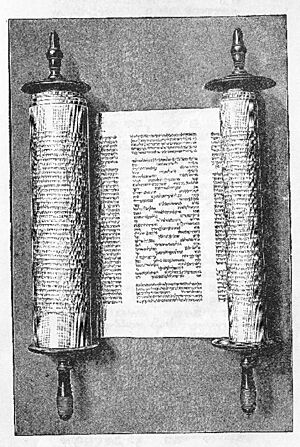Torah facts for kids
| Part of a series on | |||
|---|---|---|---|
|
|||
| Judaism | |||
| Category | |||
| Jewish religious movements | |||
| Orthodox (Haredi • Hasidic • Modern) | |||
| Conservative • Reform | |||
| Reconstructionist • Renewal • Humanistic | |||
| Jewish philosophy | |||
| Principles of faith • Kabbalah • Messiah • Ethics | |||
| Chosenness • Names of God • Musar | |||
| Religious texts | |||
| Tanakh (Torah • Nevi'im • Ketuvim) | |||
| Ḥumash • Siddur • Piyutim • Zohar | |||
| Rabbinic literature (Talmud • Midrash • Tosefta) | |||
| Religious Law | |||
| Mishneh Torah • Tur | |||
| Shulchan Aruch • Mishnah Berurah | |||
| Kashrut • Tzniut • Tzedakah • Niddah • Noahide laws | |||
| Holy cities | |||
| Jerusalem • Safed • Hebron • Tiberias | |||
| Important figures | |||
| Abraham • Isaac • Jacob | |||
| Moses • Aaron • David • Solomon | |||
| Sarah • Rebecca • Rachel • Leah | |||
| Rabbinic sages | |||
| Jewish life cycle | |||
| Brit • Pidyon haben • Bar/Bat Mitzvah | |||
| Marriage • Bereavement | |||
| Religious roles | |||
| Rabbi • Rebbe • Posek • Hazzan/Cantor | |||
| Dayan • Rosh yeshiva • Mohel • Kohen/Priest | |||
| Religious buildings & institutions | |||
| Synagogue • Beth midrash • Mikveh | |||
| Sukkah • Chevra kadisha | |||
| Holy Temple / Tabernacle | |||
| Jewish education | |||
| Yeshiva • Kollel • Cheder | |||
| Religious articles | |||
| Sefer Torah • Tallit • Tefillin • Tzitzit • Kippah | |||
| Mezuzah • Hanukiah/Menorah • Shofar | |||
| 4 Species • Kittel • Gartel | |||
| Jewish prayers and services | |||
| Shema • Amidah • Aleinu • Kaddish • Minyan | |||
| Birkat Hamazon • Shehecheyanu • Hallel | |||
| Havdalah • Tachanun • Kol Nidre • Selichot | |||
| Judaism & other religions | |||
| Christianity • Islam • Judeo-Christian | |||
| Abrahamic faiths | |||
| Related topics | |||
| Antisemitism • The Holocaust • Israel • Zionism | |||
The Torah is a very important word in Judaism. It comes from the Hebrew word for "instructions" or "teaching." When people talk about the Torah, they usually mean a few different things:
- The first five books of the Bible. These are the beginning of both the Jewish and Christian Bibles.
- The entire Jewish Bible, also called the Tanakh.
- All Jewish teachings in general.
The first five books of the Bible are:
- Genesis (called Bereishit in Hebrew)
- Exodus (called Shemot in Hebrew)
- Leviticus (called Vayikra in Hebrew)
- Numbers (called Bemidbar in Hebrew)
- Deuteronomy (called Devarim in Hebrew)
These five books are also known as the "Five Books of Moses" or the "Pentateuch". They are called the Five Books of Moses because, according to tradition, Moses received them from God.
Contents
Reading the Torah
Each of the books in the Torah is divided into smaller parts called "Parshiyot." The word Parsha means "portion" in Hebrew.
Every Shabbat (the Jewish day of rest), one parsha is read aloud in the synagogue. Sometimes, two portions are read. This way, all the parshiyot are read through completely each year. This yearly cycle ends on the Jewish holiday of Simchat Torah.
When the Torah is read in Hebrew, it is read from right to left.
What is the Pentateuch?
The word Pentateuch comes from two Greek words. It means "five books" or "five scrolls." It is another name for the first five books of the Bible, which are: Genesis, Exodus, Leviticus, Numbers, and Deuteronomy.
According to tradition, the Israelite leader Moses wrote these books. That is why the Pentateuch is often called the Five Books of Moses or the Torah.
Stories in the Pentateuch
The Pentateuch tells a long story. It starts with the creation of the world and ends with the death of Moses. It also describes the Israelites getting ready to enter the land of Canaan.
The story can be thought of in three main parts:
- The first part (Genesis chapters 1-11) is about the Creation of the world. It also tells about the very first human beings on Earth.
- The second part (Genesis chapters 12-50) shares stories about the early ancestors of the Israelites. These include important figures like Abraham, Isaac, Jacob, and Joseph.
- The third part begins with the book of Exodus. It describes how the Israelites left Egypt. It also tells the early history of the people of Israel as a nation. This part also includes many laws. These laws explain how the Israelites were meant to build their society.
The book of Deuteronomy is mostly Moses's final speech to his people. It also summarizes the main teachings of the Pentateuch.
How Old is the Pentateuch?
Many experts believe the Pentateuch is the oldest part of the Bible. Some scholars think parts of it might have been written more than 1,000 years before the final versions.
Modern archaeological discoveries suggest that some of the oldest stories in Genesis could be from three thousand years ago.
Images for kids
-
Torah scroll at the old Glockengasse Synagogue (reconstruction) in Cologne.
See also
 In Spanish: Torá para niños
In Spanish: Torá para niños











